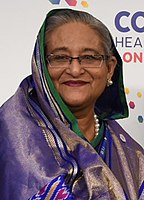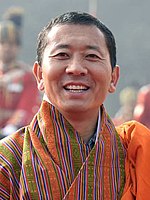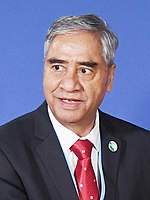Bay of Bengal Initiative for Multi-Sectoral Technical and Economic Cooperation
Template:Infobox Geopolitical organization
The Bay of Bengal Initiative for Multi-Sectoral Technical and Economic Cooperation[1] (BIMSTEC) is an international organisation of seven countries of Indian Subcontinent and Southeast Asia, housing 1.73 arab people and having a combined gross domestic product of US$4.4 trillion (2022).[2][3] The BIMSTEC member states – Bangladesh, Bhutan, India, Myanmar, Nepal, Sri Lanka, and Thailand[4] – are among the countries dependent on the Bay of Bengal.
Fourteen priority sectors of cooperation have been identified and several BIMSTEC centres have been established to focus on those sectors.[2][5] A BIMSTEC free trade agreement is under negotiation (c. 2018), also referred Similar to SAARC.
Leadership is rotated in alphabetical order of country names. The permanent secretariat is in Dhaka, Bangladesh.
Background[edit]
On 6 June 1997, a new sub-regional grouping was formed in Bangkok under the name BIST-EC (Bangladesh, India, Sri Lanka, and Thailand Economic Cooperation).[6][7] Following the inclusion of Myanmar on 22 December 1997 during a special Ministerial Meeting in Bangkok, the Group was renamed ‘BIMST-EC’ (Bangladesh, India, Myanmar, Sri Lanka and Thailand Economic Cooperation). In 1998, Nepal became an observer. In February 2004, Nepal and Bhutan became full members.
On 31 July 2004, in the first Summit the grouping was renamed as BIMSTEC or the Bay of Bengal Initiative for Multi-Sectoral Technical and Economic Cooperation.[8]
Objective[edit]
There are 16 main sectors of BIMSTEC along technological and economic cooperation among South Asian and Southeast Asian countries along the coast of the Bay of Bengal.
- Trade & Investment
- Transport & Communication
- Energy
- Tourism
- Technology
- Fisheries
- Agriculture
- Public Health
- Poverty Alleviation
- Counter-Terrorism & Transnational Crime
- Environment & Disaster Management
- People-to-People Contact
- Cultural Cooperation
- Climate Change
Sectors 7 to 13 were added at the 8th Ministerial Meeting in Dhaka in 2005 while the 14th sector was added in 11th Ministerial Meeting in New Delhi in 2008.
Member nations are denoted as Lead Countries for each sector.
- Provides cooperation to one another for the provision of training and research facilities in educational vocational and technical fields
- Promote active collaboration and mutual assistance in economic, social, technical and scientific fields of common interest
- Provides help to increase the socio-economic growth of the member countries
Permanent Secretariat[edit]
The BIMSTEC Permanent Secretariat at Dhaka was opened in 2014 and India contributes 32% of its expenditure.[2][9] The current Secretary General of the BIMSTEC is Ambassador Tenzin Lekphell from Bhutan and the former Secretary General was M Shahidul Islam from Bangladesh. And First Secretary General was Sumith Nakandala from Sri Lanka.
Chairmanship[edit]
Template:Supranational Asian Bodies The BIMSTEC uses the alphabetical order for the Chairmanship. The Chairmanship of the BIMSTEC has been taken in rotation commencing with Bangladesh (1997–1999).[10]
Member nations[edit]
Heads of the member nations[edit]
Leaders are either heads of state or heads of government, depending on which is constitutionally the chief executive of the nation's government.
BIMSTEC priority sectors[edit]
14 priority areas have been identified with the lead nations appointed to lead the effort:[2][5][12] The organisation has 15 priority areas for cooperation, including Trade & Investment, Transport & Communication, Energy, Tourism, Technology, Fisheries, Agriculture, Public Health, Poverty Alleviation, Counter-Terrorism & Transnational Crime, Environment & Disaster Management, People-to-People Contact, Cultural Cooperation, Climate Change and Blue Economy.
| Priority Area | Lead Country | Centre | Comments |
|---|---|---|---|
| Transport and communication | |||
| Tourism | BIMSTEC Tourism Information Centre, Delhi | ||
| Counterterrorism and transnational crime | Four subgroups: Intelligence sharing – Sri Lanka (lead), Terror financing – Thailand, Legal – Myanmar, Law enforcement and narcotics – | ||
| Environment and disaster management | BIMSTEC Weather and Climate Centre, Noida | ||
| Energy | BIMSTEC Energy Centre, Bengaluru | BIMSTEC Grid Interconnection MoU signed in 2014.[13][14] | |
| Public Health | BIMSTEC Network of Traditional Medicine in India | ||
| Agriculture | |||
| Trade & Investment | |||
| Technology | |||
| Fisheries | |||
| People-to-People Contact | |||
| Poverty Alleviation | |||
| Climate Change | |||
| Cultural Cooperation | 1200 ITEC scholarships by India |
In a virtual BIMSTEC Colombo summit which took place on March 30, 2022, decision was taken to reduce, re-constitute and reconstruct the number of sectors of co-operation from the unwieldy 14 to a more manageable 7.
- Trade, Investment and Development - Bangladesh
- Environment and Climate Change - Bhutan
- Security and Energy - India
- Agriculture and Food Security - Myanmar
- People-to-people Contact - Nepal
- Science, Technology and Innovation - Sri Lanka
- Connectivity - Thailand
BIMSTEC Free Trade Area Framework Agreement[edit]
The BIMSTEC Free Trade Area Framework Agreement (BFTAFA) has been signed by all member nations to stimulate trade and investment in the parties, and attract outsiders to trade with and invest in the BIMSTEC countries at a higher level. Subsequently, the "Trade Negotiating Committee" (TNC) was set up, with Thailand as the permanent chair, to negotiate in areas of trade in goods and services, investment, economic co-operation, trade facilitations and technical assistance for LDCs. Once negotiation on trade in goods is completed, the TNC would then proceed with negotiation on trade in services and investment.[15]
The BIMSTEC Coastal Shipping Agreement draft was discussed on 1 December 2017 in New Delhi, to facilitate coastal shipping within 20 nautical miles of the coastline in the region to boost trade between the member countries. Compared to the deep sea shipping, coastal ship require smaller vessels with lesser draft and involve lower costs. Once the agreement becomes operational after it is ratified, a lot of cargo movement between the member countries can be done through the cost effective, environment friendly and faster coastal shipping routes.[16] The necessity for coastal shipping ecosystem and electricity grid interconnectivity, as two of the necessary components of the evolving shape of BIMSTEC.
On 7 and 8 November 2019, the first ever BIMSTEC Conclave of Ports summit was held in Visakhapatnam, India.[17] The main aims of this summit is providing a platform to strengthen maritime interaction, port-led connectivity initiatives and sharing best practices among member countries.
In 2022 summit saw the declaration of the Master Plan for Transport Connectivity that would provide a framework for regional and domestic connectivity,
Cooperation with Asian Development Bank (ADB)[edit]
The Asian Development Bank (ADB) becomes a partner in 2005, to undertake the "BIMSTEC Transport Infrastructure and Logistic Study" (BTILS), which was completed in 2014.[18]
BIMSTEC Summits[edit]

| No. | Date | Host country | Host city |
|---|---|---|---|
| 1st | 31 July 2004 | Bangkok | |
| 2nd | 13 November 2008 | New Delhi | |
| 3rd | 4 March 2014 | Naypyidaw[19] | |
| 4th | 30–31 August 2018 | Kathmandu[20][21][22] | |
| 5th | 30 March 2022 | Colombo (Virtual meeting)[23] |
Projects[edit]
- Coast shipping
- Power grid interconnection
- Regional disaster monitoring and warning system
- Road and rail Look-East connectivity projects
See also[edit]
- ASEAN & Look-East connectivity projects
- Asia Cooperation Dialogue
- Asian Clearing Union
- Asian Development Bank
- Bangladesh Bhutan India Nepal Initiative (BBIN)
- BRICS-BIMSTEC Summit, 2016
- Mekong-Ganga Cooperation
- South Asian Association for Regional Cooperation (SAARC)
- South Asia Subregional Economic Cooperation
Notes[edit]
- ↑ 1.0 1.1 The president is the constitutional chief executive, but Acting President Myint Swe has delegated his executive authority to military leader Min Aung Hlaing for the duration of an ongoing state of emergency.
References[edit]
- ↑ Hindi: बङ्गाल की खाड़ी बहुक्षेत्रीय तकनीकी एवं आर्थिक सहयोग पहल
- ↑ 2.0 2.1 2.2 2.3 BIMSTEC: Building bridges between South Asia & Southeast Asia Archived 22 December 2017 at the Wayback Machine, IndiaWrites, 2014.
- ↑ BIMSTEC
- ↑ "Regional economic integration in the Bay of Bengal". 25 February 2016.
- ↑ 5.0 5.1 "Energy". bimstec.org. Archived from the original on 6 December 2017. Retrieved 6 December 2017.
- ↑ Haidar, Suhasini (15 October 2016). "BIMSTEC a sunny prospect in BRICS summit at Goa". The Hindu. Retrieved 16 October 2016.
- ↑ "BRICS Summit 2016: BIMSTEC members have economic opportunities to share, said Narendra Modi". The Economic Times. Retrieved 16 October 2016.
- ↑ See for a detailed historical account of the founding and evolution of BIST-EC and BIMST-EC e.g. Michael, Arndt (2013). India's Foreign Policy and Regional Multilateralism (Palgrave Macmillan), pp. 145–163.
- ↑ "Area of cooperation". Archived from the original on 22 December 2017. Retrieved 21 December 2017.
- ↑ "Third BIMSTEC Summit Declaration". Retrieved 12 March 2014.
- ↑ "World Economic Outlook Database, October 2019". IMF.org. International Monetary Fund. 15 October 2019. Retrieved 3 September 2019.
- ↑ BIMSTC sectors
- ↑ "India Cabinet Approves Signing of BIMSTEC Power Grid Pact | News | South Asia Subregional Economic Cooperation". www.sasec.asia. Retrieved 6 December 2017.
- ↑ "Nepal to join BIMSTEC Grid Interconnection". Retrieved 6 December 2017.
- ↑ "Bimstec committee mulls free trade deal in Dhaka". 13 November 2018. Archived from the original on 30 March 2019. Retrieved 30 March 2019.
- ↑ "BIMSTEC Member States discuss draft text of Coastal Shipping Agreement".
- ↑ "First BIMSTEC Conclave of Ports, Vishakhapatnam (November 7-8, 2019)".
- ↑ BIMSTEC Transport Infrastructure and Logistic Study
- ↑ "BIMSTEC Summit". Bay of Bengal Initiative for Multi-Sectoral Technical and Economic Cooperation. Retrieved 17 December 2016.
- ↑ "Nepal proposes dates for Bimstec Summit". Business Standard India. 5 June 2018. Retrieved 1 July 2018.
- ↑ Cite error: Invalid
<ref>tag; no text was provided for refs namedBIMSTEC2018 - ↑ "4th BIMSTEC Summit: Kathmandu Declaration adopted by Member States". 31 August 2018. Retrieved 31 August 2018.
- ↑ "5th BIMSTEC Summit, Sri Lanka (March 30, 2022)". mea.gov.in. Retrieved 28 March 2022.
External links[edit]
{{URL|example.com|optional display text}}- BIMSTEC free trade agreement
- 2018 BIMSTEC Summit
- Pages using Lang-xx templates
- 1997 establishments in Asia
- International economic organizations
- International organizations based in Asia
- Organizations established in 1997
- Foreign relations of Bangladesh
- Foreign relations of Bhutan
- Foreign relations of India
- Foreign relations of Myanmar
- Foreign relations of Nepal
- Foreign relations of Sri Lanka
- Foreign relations of Thailand
- Bay of Bengal
- Bhutan–India relations



![Template:Country data Republic of the Union of Myanmar Min Aung Hlaing Prime Minister of Myanmar[lower-alpha 1]](https://upload.wikimedia.org/wikipedia/commons/thumb/1/16/%D0%9C%D0%B8%D0%BD_%D0%90%D1%83%D0%BD_%D0%A5%D0%BB%D0%B0%D0%B9%D0%BD_%D0%B2_%D0%A2%D0%B0%D1%82%D0%B0%D1%80%D1%81%D1%82%D0%B0%D0%BD%D0%B5_04_%2825-06-2021%29_%28cropped_3%29.jpg/150px-%D0%9C%D0%B8%D0%BD_%D0%90%D1%83%D0%BD_%D0%A5%D0%BB%D0%B0%D0%B9%D0%BD_%D0%B2_%D0%A2%D0%B0%D1%82%D0%B0%D1%80%D1%81%D1%82%D0%B0%D0%BD%D0%B5_04_%2825-06-2021%29_%28cropped_3%29.jpg)



